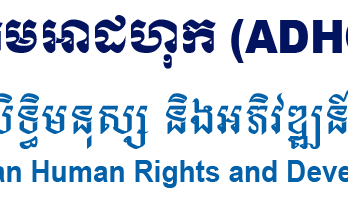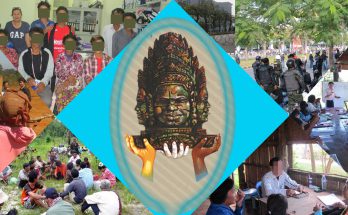2 July 2012 – Raffles Hotel Le Royal, Phnom Penh
On 2 July 2012, Cambodian Human Rights and Development Association (ADHOC) convened speakers from various organizations and backgrounds to discuss and present on the fight against impunity and the prevention of mass crimes in Cambodia. The conference took place on the tenth anniversary of the Rome Statute’s entry into force. Speakers were drawn from the ECCC, universities, and the regional office of the Coalition for the ICC.
Thun Saray, ADHOC’s President, opened the conference by speaking broadly of the ICC’s progress since its inception and of its implementation in Cambodia. Following this introduction, Sok Sam Oeun (Executive Director, Cambodian Defenders Project) spoke more comprehensively on the jurisdiction and implementation of the ICC in Cambodia.
Evelyn Balais-Serrano (Regional Coordinator for Asia-Pacific of the Coalition for the ICC) discussed the Coalition for the ICC and global progress of the ICC. She highlighted key challenges which endure for extension of the ICC’s reach among which, the lack of signatories from the world’s most powerful nations and those responsible for widespread human rights violations were highlighted. She praised Cambodia for its participation and called for its continued support in efforts to expand membership within the ASEAN community.
Andrew T Cayley QC (International Co-Prosecutor, ECCC) highlighted the principle of complementarity and its fundamentality for the ICC. He discussed the principle in its depth, stressing its centrality to the court and outlining the jurisdictional and procedural features.
Hisham Mousar (Chef de projet, Université Royale de droit et des sciences économiques) followed with a read-out on the lingering obstacles in Cambodian law to implementation of the Rome Statute in Cambodia. He identified the chief hurdles as relating to (1) amnesty and pardon; (2) ability by the National Assembly to delete sentences or strike out prosecution of individuals. He identified Article 31 of the Constitution of Cambodia, which requires the creation of national legislation to give effect to international conventions, as another significant roadblock to effective implementation. This discussion was used as a platform to support his recommendation for amendments to the Criminal Code and Code of Criminal Procedures to accomplish this. (see FIDH report on ”International Criminal Court: Adaption of Cambodian Law to the Rome Statue”, March 2006, n443/2, http://www.fidh.org/IMG/pdf/cambodge443angformatword.pdf)
He identified an agreement ratified in 2005 between the US and Cambodia, regarding non-surrender of persons to the ICC, as a final obstacle to the Rome Statute’s implementation in Cambodia.
Simon M. Meisenberg’s (CIM Advisor to the Trial Chamber, ECCC) presentation extended Mr. Mousar’s discussion regarding the domestic incarnation of the Rome Statute. While the implementing legislation was concluded in 2010, he argued there are significant discrepancies and deficiencies which need to be addressed. Whereas the Rome Statute stipulates 72 war crimes provisions, the Cambodian law only has 16. He also highlighted dissimilar semantic expression of the provisions themselves. His conclusion echoed that of Mr. Mousar; there is significant room for improvement of the Cambodian legal expression of its ICC obligations.
The conference was concluded with closing remarks by ADHOC President, Thun Saray. He professed ADHOC’s continuing commitment to affecting the necessary changes in Cambodian domestic law to bring Cambodia closer towards the goal of compliance, and appealed to the Cambodian government to continue to apply pressure for more ASEAN members to ratify the Rome statute and for all stakeholders to remain patient in the evolution of ICC implementation.



